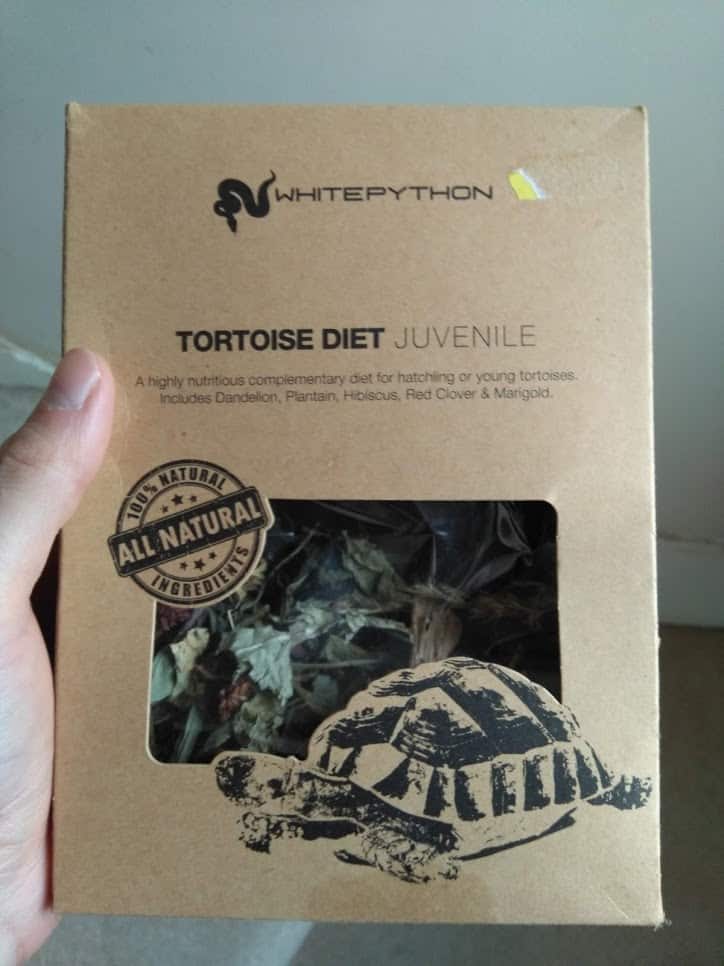
Tortoises can eat dry weeds, but before offering them you must ensure your tortoise is hydrated by other means. Wild tortoises will not eat dry foods if they are dehydrated, because they know it can be harmful to them. In captivity, you need to ensure a tortoise is hydrated before you feed it dried weeds.
A tortoise’s diet must be varied. It should contain every nutrient and vitamin the tortoise requires to stay healthy and strong. Dried weeds can certainly fulfill these requirements and can be given in moderation while making sure that the tortoise is hydrated.
The great thing about tortoises is that most of them have a purely herbivorous diet, and if you can give them enough fiber, a large variety of vegetation, and one or two high quality supplements, the tortoise will live a happy life. Again, dried leaves and weeds can comfortably form part of this diet.
Although it is easy to prepare and store dried vegetation, you must always know which dried plants may be added to the tortoise’s diet and which should not.
If you recently became a tortoise owner and want to make sure you offer the right diet in terms of dried produce, be sure to keep on reading.
Are Dry Weeds Good for Your Tortoise?
Tortoises can eat dry weeds. In fact, it’s great if you can combine dry weeds with the rest of the foods in their diet. However, it is important to keep in mind that the nutrient content in the leaves varies depending on the seasons.
Wild tortoises will eat dried weeds, but they only do so if they are hydrated. If they have no water source available to them, they will refrain from eating dried-up material. They instinctively know that it isn’t a good idea to eat anything dry when they are already dehydrated.
In captivity, you are the one responsible for the hydration of your tortoise. If you give it dry weeds, you must also make sure you have fresh water available for it at all times so that dehydration will not be a issue. Having fresh water in the enclosure means you will not have to soak the weeds before feeding them to the tortoise.
A distinct advantage of dried weeds is that they are often high in nutrients due to the fact they shrink as they dry, which concentrates the bulk of the leaves significantly.
Whilst this is great for maximising nutritional intake, you need to make sure you offer dried weeds in moderation, particularly to avoid your tortoise consuming too much protein. It is however possible to find weeds that have less protein than others.
How Much of the Diet Should Consist of Dried Weeds?
Usually, the bulk of your tortoise’s diet should consist of fresh weeds and greens, and even grasses if we’re talking about a grazing species such as a Sulcata tortoise. But while it is easy to find greens in fresh form during the summer and spring, the cold season comes with some challenges and finding fresh leaves and weeds quickly becomes more difficult. For this reason, you might want to consider introducing dried weeds and leaves during fall and winter.
Dry leaves can form a large portion of your tortoise’s diet during the colder months of the year, although again, you need to account for the fact that they are a denser form of the fresh plants you would feed during spring and summer by providing slightly less.
What’s great is that you can just collect weeds yourself and dry them, preparing them in bulk for winter. If you do not have time to do this, you can also buy organic dried leaves. In all honesty though, it is better to make an effort and collect them yourself, especially if your tortoise’s favourite leaves are not found in dried form.
Not to mention of course that picking and drying your own doesn’t cost anything!
On top of that, you can simply keep them on the shelf for two years, as they can last this long in their dried state. It’s simply a case of putting them in a resealable bag and placing them in a dark spot. This way, you will have plenty of dried weeds available throughout the year.
What Are Some of the Most Popular Dried Weeds for Tortoises?
There are some dried weeds that are certainly more popular than others. Here are some of those most commonly considered by tortoise owners.
- Spearmint Leaves
Spearmint is sometimes offered to tortoises, but they do not like it that much due to the very strong smell. However, these leaves contain lots of vitamins and nutrients. They are a great source of calcium, manganese, iron, magnesium, calcium, vitamin A, vitamin C, vitamin B6, and many others minerals. So, you should certainly try to mix them with some of their other foods.
Whilst the spearmint plant isn’t necessarily a ‘weed’, it isn’t particularly difficult to grow either and would be well worth growing in your garden or yard. This way you’ll have a stock of leaves on hand at all times.
- Plantain (the weed, not the banana type thing!)
Plantain is considered a great all round food for tortoises. The leaves of this weed contain calcium, potassium, and vitamin C, so they make a great addition to a tortoise’s diet. You can sprinkle the dried plantain on your tortoise’s food.
Plantain is readily found all over the world, and is therefore very easy to find and harvest.
- Oatstraw
Another great addition to a tortoise’s diet during the cold season is oatstraw. This is a good thing to mix with its other foods if you want to introduce it to hay and grass, especially if we’re talking about hatchling or young tortoises. The texture and taste will be great for the tortoise, and you can slowly make the transition towards hay and grass.
I personally haven’t come across oat plants on my own foraging expeditions, however it is readily available to buy in its dried form.
- Dandelion Leaves
It is not a surprise that tortoises love dandelions. They tend to eat the flowers and the leaves at all times. But during winter, when there are no dandelions growing outside, you can simply give your pet dried dandelion leaves. The plant has a lot of vitamin K and calcium. If you are going to add it to the reptile’s diet, you should give it a pinch one or two times every week.
Dandelions are of course found just about everywhere in huge numbers, so drying out a decent stock of them should be achievable for just about anybody.
- Alfalfa Leaves
Alfalfa leaves are a great source of protein for tortoises. Although they are not always recommended for a tortoise’s diet, they can be offered in very small amounts. Never go overboard with it, or indeed any other protein rich food source. Ideally, you should only give this to your tortoise once per week.
The Bottom Line
Tortoises can eat dry weeds as long as you offer them in moderation and endeavour to combine them with other foods. In order to add dried weeds to a tortoises’s diet, you must make sure you always have fresh water ready for the tortoise. Otherwise, it may not be a good idea to feed the tortoise dried weeds because it will not be good for their digestive system.

